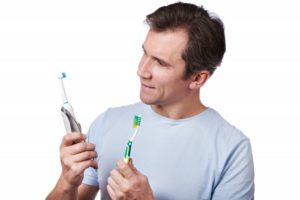 Consumers have been wondering whether it’s worth it to make the upgrade. The spinning toothbrush heads and exceptional power is appealing, but what if it doesn’t matter which brush you use? Either way, your dentist in State College knows the true pros and cons of both devices and what you can expect from both.
Consumers have been wondering whether it’s worth it to make the upgrade. The spinning toothbrush heads and exceptional power is appealing, but what if it doesn’t matter which brush you use? Either way, your dentist in State College knows the true pros and cons of both devices and what you can expect from both.
You’ll also get his professional verdict, so you know exactly what you need to prevent tooth decay and gum disease, without needing to break the bank.
The Pros and Cons of Manual Brushes
Manual brushes have been helping patients of all ages keep their teeth clean for a very long time. Keep in mind they were doing this perfectly well way before electric brushes were on the market. They’re inexpensive, portable, and come in a wide variety of handles, bristle styles, and colors! They’re also easy to replace and require no additional batteries or assembly to use out of the box.
Of course, with old technology comes a lack of perks that may enhance your brushing routine. Manual brushes require patients to have their brushing technique perfected for the most optimal use. This may prove difficult for those with arthritis or other disabilities that impede their daily brushing.
Furthermore, manual brushes don’t have timers, which may be a preference you enjoy. Having a timer is a great way to make sure you brush for the necessary two minutes, especially if you’re young and brushing for the first time.
The Pros and Cons of Electric Brushes
With the added cost of an electric toothbrush comes a very healthy dose of perks. Electric toothbrushes, whether vibrating or sonic, come with their own customizable toothbrush heads. If you prefer a straighter head over a circular one, you’re more than capable of customizing it to your preference. Additionally, electric brushes are ideal for people with dexterity problems, braces, or those who simply want to make brushing easier and more exciting.
Of course, electric brushes are known for costing many more times than a manual brush, in some cases up to a hundred times more. If they break and lose the ability to vibrate, particularly when traveling, they’re more difficult to replace. If you forget your charger or the charger breaks, you lose a huge feature you once enjoyed while brushing.
Your Dentist’s Verdict
After comparing the two, your dentist in State College wants patients to know that your at-home oral care depends heavily on the following factors:
- Your brushing technique
- Your willingness to brush
- Your comfortability
At the end of the day, you need to choose a brush that will motivate you to commit to daily oral care. That means you should find something that fits comfortably in your hand, mouth, and doesn’t make you dread brushing twice a day. You’ll also want to confirm with your dentist that your brushing in the most optimal way possible, regardless of the brush you choose.
On top of your brushing, you’ll need to visit your dentist every six months for cleanings and a thorough examination. Schedule an appointment today to learn if your technique is up to par!
About the Author
Dr. Donald M. Marks earned his Doctor of Medicine in Dentistry degree from the University of Pittsburgh. He continues his education through multiple notable institutions, including SPEAR, the Scottsdale Center for Dentistry, and the Institute for Advanced Dental Studies. To learn more about his practice, contact him through his website.




